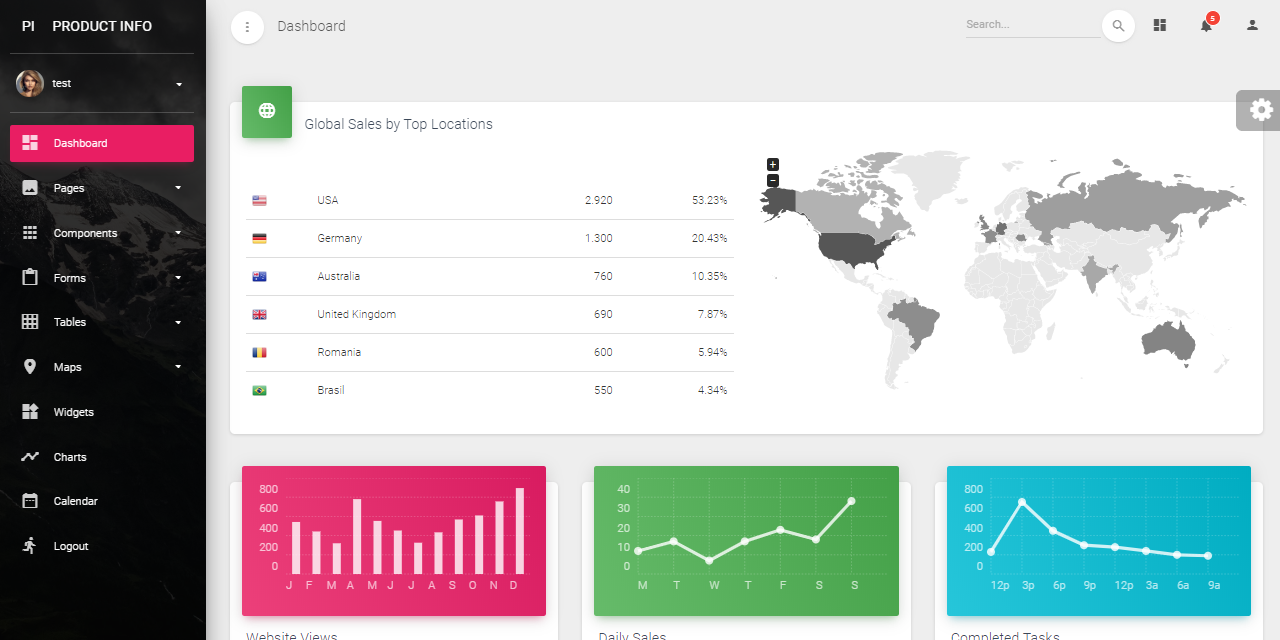Material Dashboard is a free Material Bootstrap 4 Admin with a fresh, new design inspired by Google's Material Design. We are very excited to introduce our take on the material concepts through an easy to use and beautiful set of components. Material Dashboard was built over the popular Bootstrap 4 framework and it comes with a couple of third-party plugins redesigned to fit in with the rest of the elements.
App Features:
- UI Kit: Material Dashboard (Free Version) provided by Creative-Tim
- SQLite Database, Django Native ORM
- Modular design, clean codebase
- Session-Based Authentication, Forms validation
- Deployment scripts: Docker, Gunicorn / Nginx
- Support via Github and Discord.
Links
- Django Dashboard Material - product page
- Django Dashboard Material - Demo - LIVE App
- Django Dashboard Material - Docs - product documentation
PRO versions include Premium UI Kits, Lifetime updates and 24/7 LIVE Support (via Discord)
| Django Dashboard Material PRO | Django Dashboard Black PRO | Django Dashboard Argon PRO |
|---|---|---|
 |
 |
 |
$ # Get the code
$ git clone https://github.com/app-generator/django-dashboard-material.git
$ cd django-dashboard-material
$
$ # Virtualenv modules installation (Unix based systems)
$ virtualenv env
$ source env/bin/activate
$
$ # Virtualenv modules installation (Windows based systems)
$ # virtualenv env
$ # .\env\Scripts\activate
$
$ # Install modules - SQLite Storage
$ pip3 install -r requirements.txt
$
$ # Create tables
$ python manage.py makemigrations
$ python manage.py migrate
$
$ # Start the application (development mode)
$ python manage.py runserver # default port 8000
$
$ # Start the app - custom port
$ # python manage.py runserver 0.0.0.0:<your_port>
$
$ # Access the web app in browser: http://127.0.0.1:8000/Note: To use the app, please access the registration page and create a new user. After authentication, the app will unlock the private pages.
The project is coded using a simple and intuitive structure presented bellow:
< PROJECT ROOT >
|
|-- core/ # Implements app logic and serve the static assets
| |-- settings.py # Django app bootstrapper
| |-- wsgi.py # Start the app in production
| |-- urls.py # Define URLs served by all apps/nodes
| |
| |-- static/
| | |-- <css, JS, images> # CSS files, Javascripts files
| |
| |-- templates/ # Templates used to render pages
| |
| |-- includes/ # HTML chunks and components
| | |-- navigation.html # Top menu component
| | |-- sidebar.html # Sidebar component
| | |-- footer.html # App Footer
| | |-- scripts.html # Scripts common to all pages
| |
| |-- layouts/ # Master pages
| | |-- base-fullscreen.html # Used by Authentication pages
| | |-- base.html # Used by common pages
| |
| |-- accounts/ # Authentication pages
| | |-- login.html # Login page
| | |-- register.html # Register page
| |
| index.html # The default page
| page-404.html # Error 404 page
| page-500.html # Error 404 page
| *.html # All other HTML pages
|
|-- authentication/ # Handles auth routes (login and register)
| |
| |-- urls.py # Define authentication routes
| |-- views.py # Handles login and registration
| |-- forms.py # Define auth forms
|
|-- app/ # A simple app that serve HTML files
| |
| |-- views.py # Serve HTML pages for authenticated users
| |-- urls.py # Define some super simple routes
|
|-- requirements.txt # Development modules - SQLite storage
|
|-- .env # Inject Configuration via Environment
|-- manage.py # Start the app - Django default start script
|
|-- ************************************************************************The bootstrap flow
- Django bootstrapper
manage.pyusescore/settings.pyas the main configuration file core/settings.pyloads the app magic from.envfile- Redirect the guest users to Login page
- Unlock the pages served by app node for authenticated users
The app is provided with a basic configuration to be executed in Docker, Gunicorn, and Waitress.
Docker execution
The application can be easily executed in a docker container. The steps:
Get the code
$ git clone https://github.com/app-generator/django-dashboard-material.git
$ cd django-dashboard-materialStart the app in Docker
$ sudo docker-compose pull && sudo docker-compose build && sudo docker-compose up -dVisit http://localhost:5005 in your browser. The app should be up & running.
Gunicorn 'Green Unicorn' is a Python WSGI HTTP Server for UNIX.
Install using pip
$ pip install gunicornStart the app using gunicorn binary
$ gunicorn --bind=0.0.0.0:8001 core.wsgi:application
Serving on http://localhost:8001Visit http://localhost:8001 in your browser. The app should be up & running.
Waitress (Gunicorn equivalent for Windows) is meant to be a production-quality pure-Python WSGI server with very acceptable performance. It has no dependencies except ones that live in the Python standard library.
Install using pip
$ pip install waitressStart the app using waitress-serve
$ waitress-serve --port=8001 core.wsgi:application
Serving on http://localhost:8001Visit http://localhost:8001 in your browser. The app should be up & running.
- Django - The official website
- Boilerplate Code - Index provided by AppSeed
- Boilerplate Code - Index published on Github
Django Dashboard Material - Provided by AppSeed Web App Generator.
